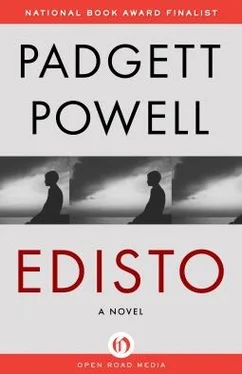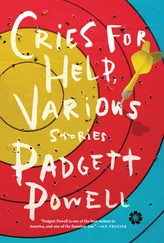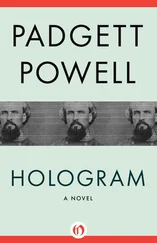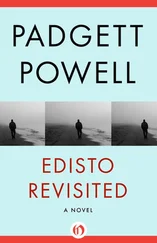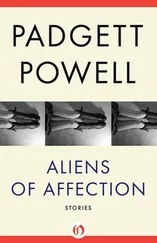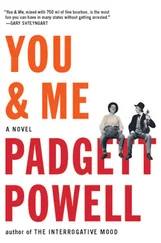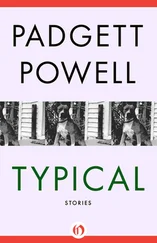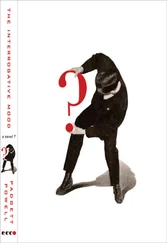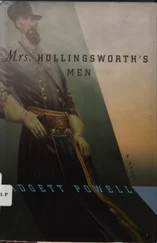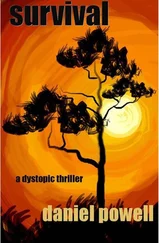The speculator bought a two-square-mile patch of desert, evenly between Savannah and Charleston, and figured to civilize it with fifty miles of city-block roads and sell it to the next wave of vacation-house affluents. He named the streets for the fifty states and those left over for their capitals. And the road on the beach, behind the first stand of dunes, he called Juno Boulevard, he told the Doctor, "for the moon." When the moon is up on this coast at this deep beach, it pours forth a hot glassy triangle over the sea, spreading just enough to illuminate both the land office and the maid’s quarters if you stand between them. At that point facing inland you can see on the left the spectacular Mars-like edifice the Doctor got cheap and named the Savannah Cabana (her version of This’ldu or Here ’tis) and which probably helped secure for her the designation "Duchess" by the locals, and on the right a regular human shack, never moved or destroyed by the developer because he never sold or came close to selling the lot it was on. The Doctor told him she would need servants’ quarters, and he threw that lot into the deal as well. I believe it was the only two lots he sold. Then the bank called in the paper.
The shack was stifling, with mosquitoes. Someone left the door open. In those days it was bug-tight, relatively speaking. Here, where the greatest natural resource is a toss-up between sand flea and mosquito, a thing is bug-tight if you do not die of a fever.
"Stand back,” I told our new livery man. "I got to gun these things." I pulled the sprayer from under Theenie’s bed, one of those old underslung can types with a slide plunger you can aim like a rifle. He not only stepped back, he went out and got some whiskey from his car.
Later we cut a hole in the windward side for the romantic view of the sea and perverted the genius of the builder. For this undoing there was no atonement. The original shack, by the grace of common sense, had faced inland, not romantically seaward, and when we got the boys’ club spirit, combined with my dreamy horseshit ("We need a Weltanschauung! ” I said), and cut a four-by-four hole, we invited an unstoppable, hourly legion of stinging pests into the shack and there was no screening them then, they could just let the wind push them gently through the wire like little hungry Houdinis, so we only put up shutters, iron-hinged, green, warped things Taurus got from Charleston, for larger pestilence, like hurricane.
But in those days if the door was shut it was all right. The stranger slapped himself a few times.
"The Cook’s tour," I said.
"Wait." He poured out four inches of his whiskey in a jelly glass and drank an ice-water gulp. "Okay."
"This is it," I said, sweeping the room with my hand. It had the order of a Negro maid: things are not out of place but they are so crowded together that what is actually a tight bit of stacking at first looks random. The bed has four blankets, each turned down more than the one beneath and each a new color — blue and brown and yellow and red — giving a crowded, messy look to the neatness of a hospital-cornered bed. A small brown radio is at a perfect angle to the listener on the bed, but it struggles on the nightstand with a Mason jar and a Jesus, and shoeboxes full of folded papers are stacked on chests, doilies are everywhere, a religious velvet painting, on the windows see-through curtains, throw rugs on the floor. The room could be a museum exhibit obliged to have everything one old black woman could have or could be known to ever have had, a composite picture of the known habitat of the Negro maid. And smells like a washed dog. It was a mosaic, because if you stood too close it looked just stuffed together, odd pieces of all manner l of cheap human conveniences glued into the room. But if you looked at it as a whole, the picture had an elegant form, was a spare machine of necessary items for a lone person to live in a single room.
He pushed the jelly glass a half foot toward me on the enameled metal table, white with a cobalt trim. I sniffed at it and took a sip and wheezed. He smiled, I reading the newspaper on the walls.
I got the cake, still in its pan, and was ready to go when something made me slow down. The Doctor had engaged this man to chauffeur me, had easily granted him Theenie’s place on the assumption she was gone and he was responsible what was going on? In their little compact it looked like they knew more than I did, a regular thing for the adults, but now I was being asked to comply with this common understanding that welcomes a process server into what passes for the family unit as the Doctor and I know it. The Boy Act is the best thing I when in doubt. "You want to look through the telescope?" I said.
"If you do,” he said.
Curious bird, I thought, taking my leave. "Wait here." I run down — time for another Empirin, the ribs are starting to creak again — and drop off the cake and get my telescope and go back. The Doctor got it to go with the old, varnished, cigar-brown globe she got me that you can’t see any particular country on, and the telescope does match: you can’t see anything particular with it either. It is brass and the old glass optics have something in them like cataracts, but for occasions like this one it serves fine. I pulled this number on one of the Doctor’s suitors once, a coroner named Cud, vulture of a fellow circled around for weeks before I got rid of him with a telescope stunt. It came very natural then. I was hiding in my room, mostly from him, because the Doctor was gone and I didn’t care to talk to him, but he’s there, waiting for her, and my door opens and I grab the first prop available, which is the scope. I hunk down on it out of reflex and the coroner says, "How’s the weather?" Again out of reflex, so I don’t reveal any idleness in my apparent absorption with the view, I hunk down as if glued to something fascinating. I am impervious, so great is the vision. I fix my eyeball airtight on the ocular lest he see a point to invite himself on in with.
"See any pirate ships out there?" he says (vomit) and I screw down so hard that the surf I’m aimed at is falling slow and fast and is gray and another gray, then becomes, like, colors, tumbling corpuscles of TV snow, which become blue and yellow and then purple and red, and then shapes begin to appear within a field of the tumbling colors.
Anyway, these cloud shapes start moving around in the view, irregular and flowing, about like when you press your eyelids. And one of them looks like a clipper ship, so I tell the coroner named Cud: "I see clipper ships at 0–9—2." Then go purple in my descriptions. Well, it worked like a charm. He was gone, as I recall, before the Doctor returned. And it occurred to me after that that it was a nifty little adult gauge, a feeler, that telescope.
But this night was a hint different. The Empirin had my tongue like a grit of sand in an oyster of nonsense, and this stranger was no Cud going to hightail because of a little imagination in the family.
I set it up outside, where the mosquitoes were less dense, and addressed the view like a mariner, legs wider than the brass tripod. I give it the old hunk, then a little juke one way, another hunk. "Oooo," I let out, a little cat moan over the surf, choirboy. Then I start tracking. "Clippers." He just stands there and looks out at the Atlantic.
"Some fetching old Yankee Doodles, yessiree." He has not flinched. "Here. You look." I stepped back, careful to hold the telescope on line, nodded to it."Come on, hurry, they’re at good speed."
The stranger took the scope. “I don't see them."
I figured the test about over, but I threw in one more thing. "More south. They’re not called clippers for nothing."
"No,” he said, "not clippers for nothing."
"Tell me what you see."
Читать дальше
